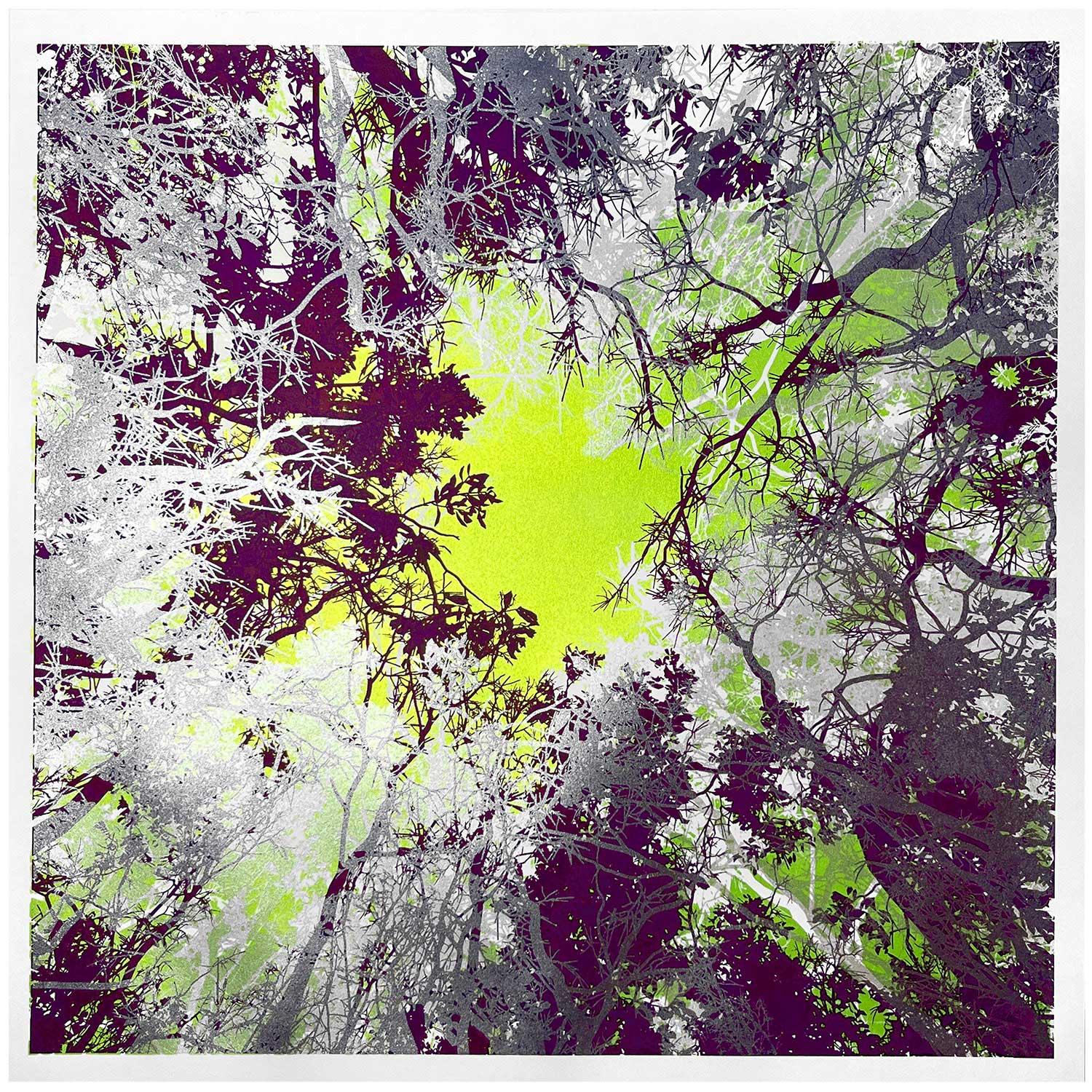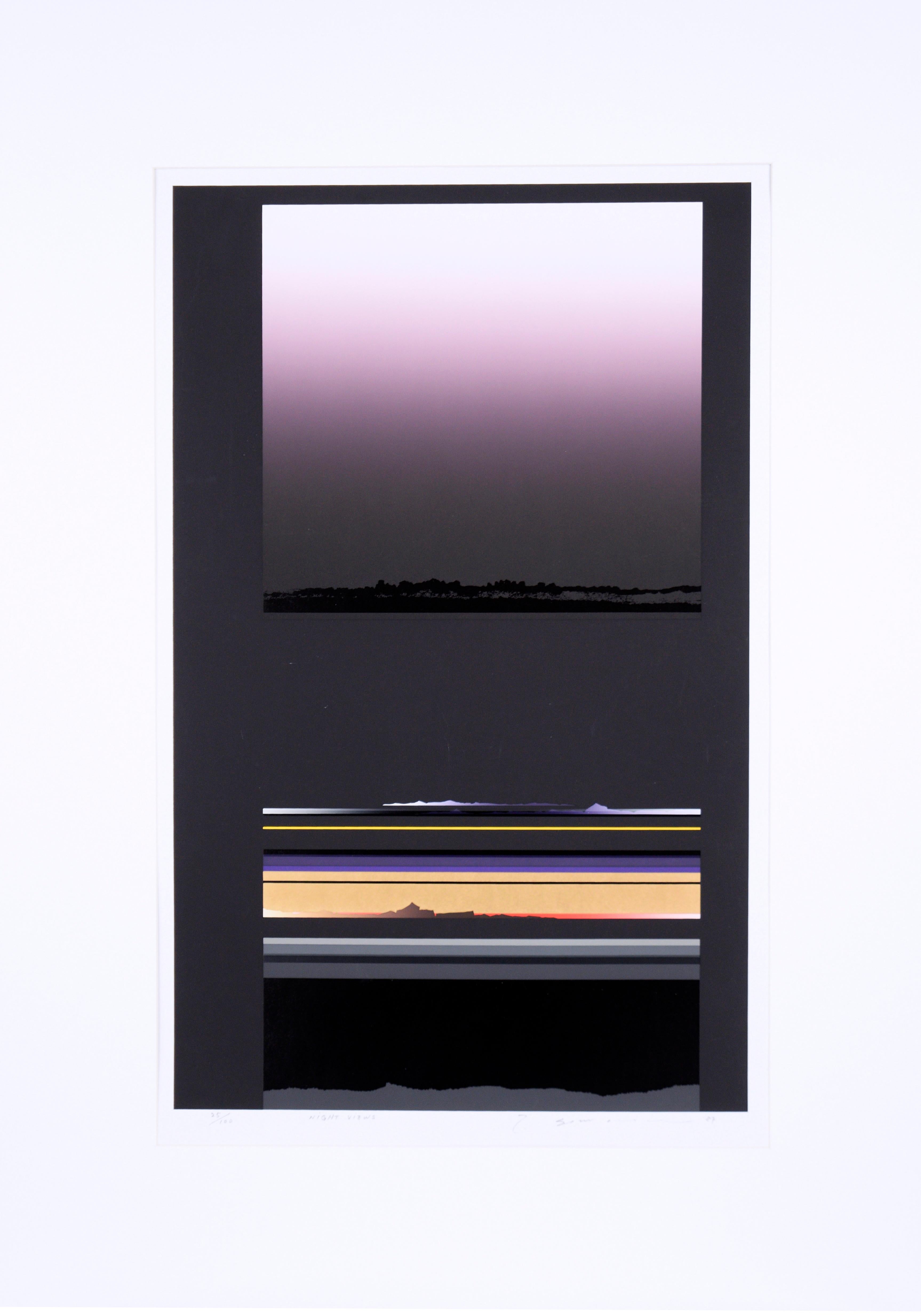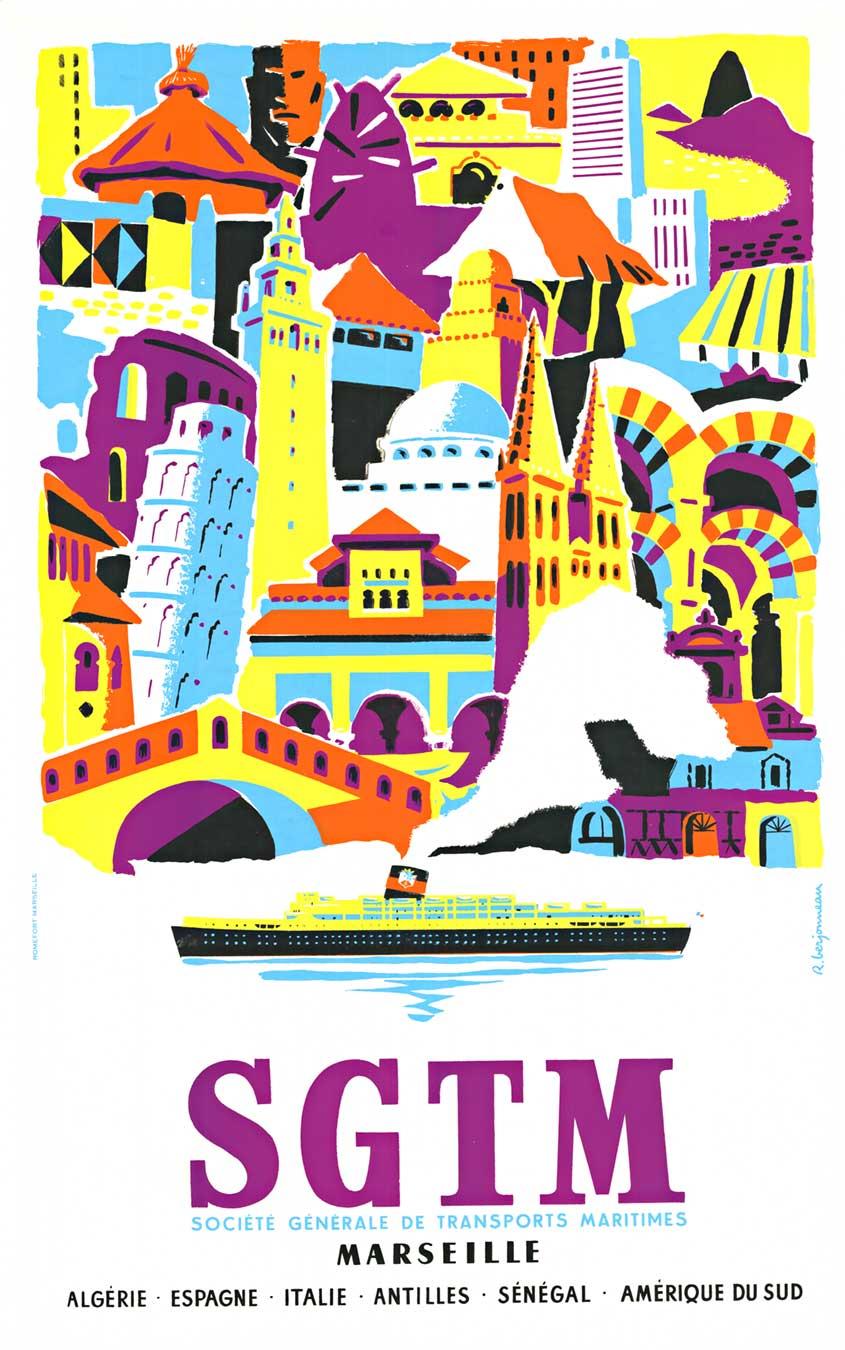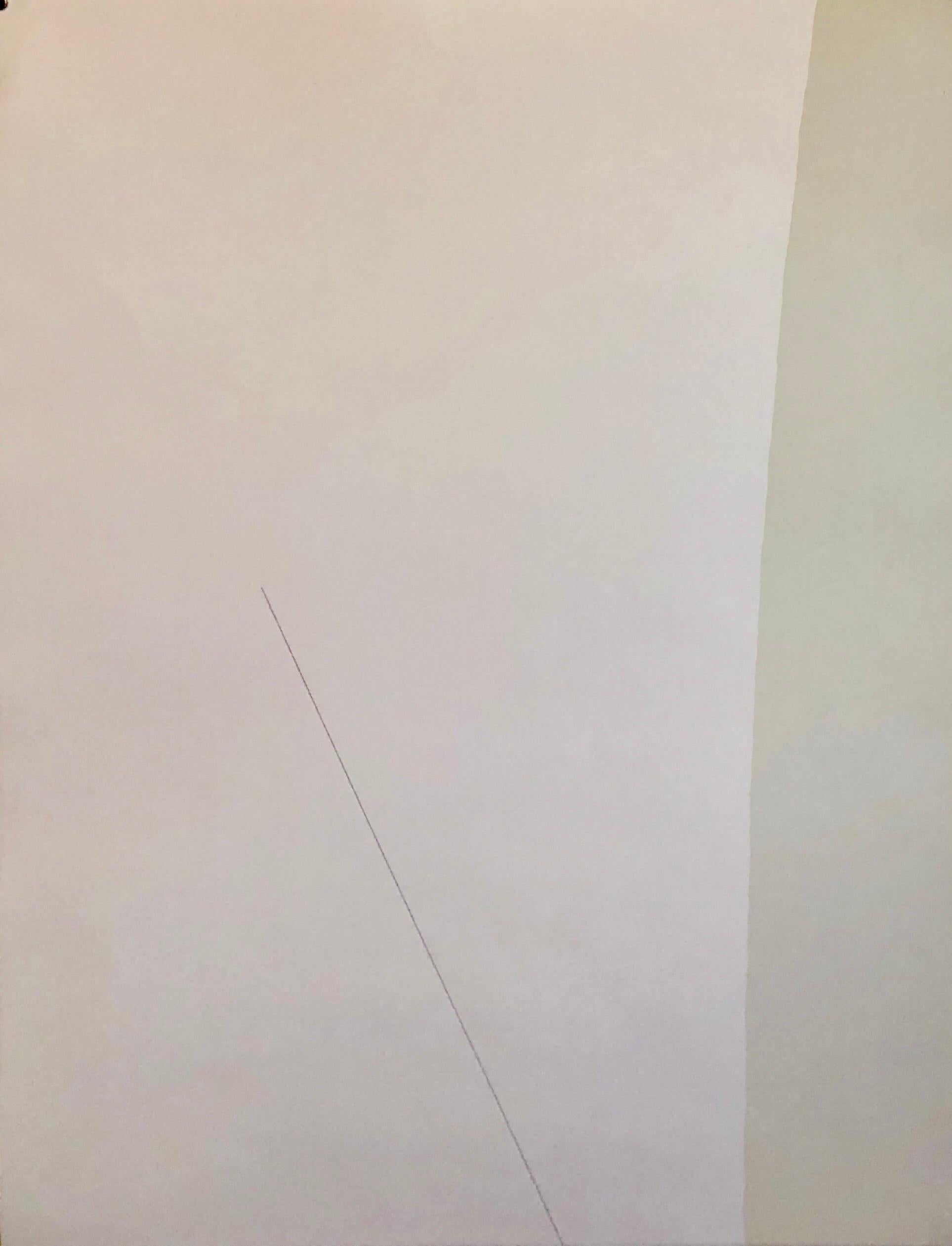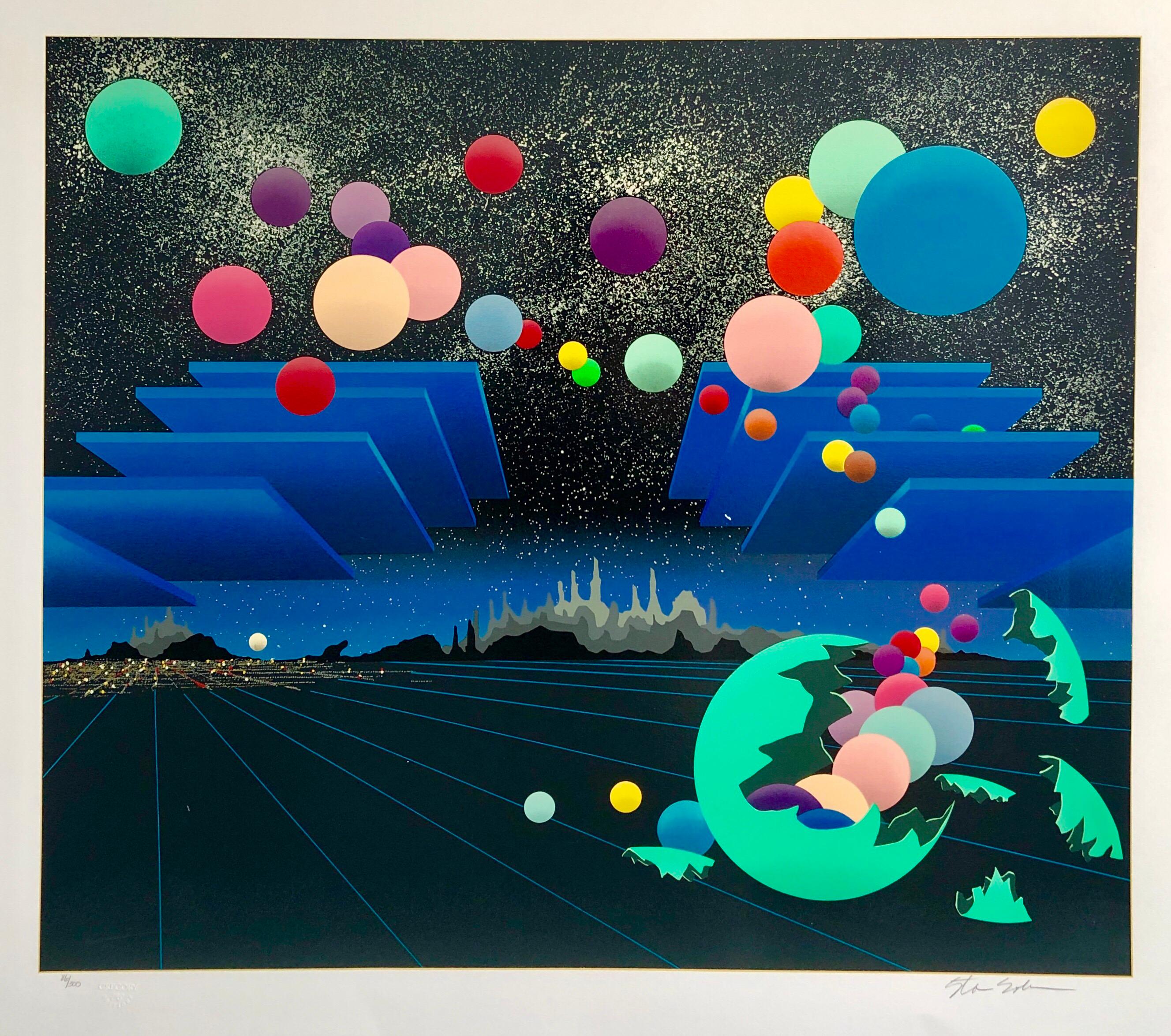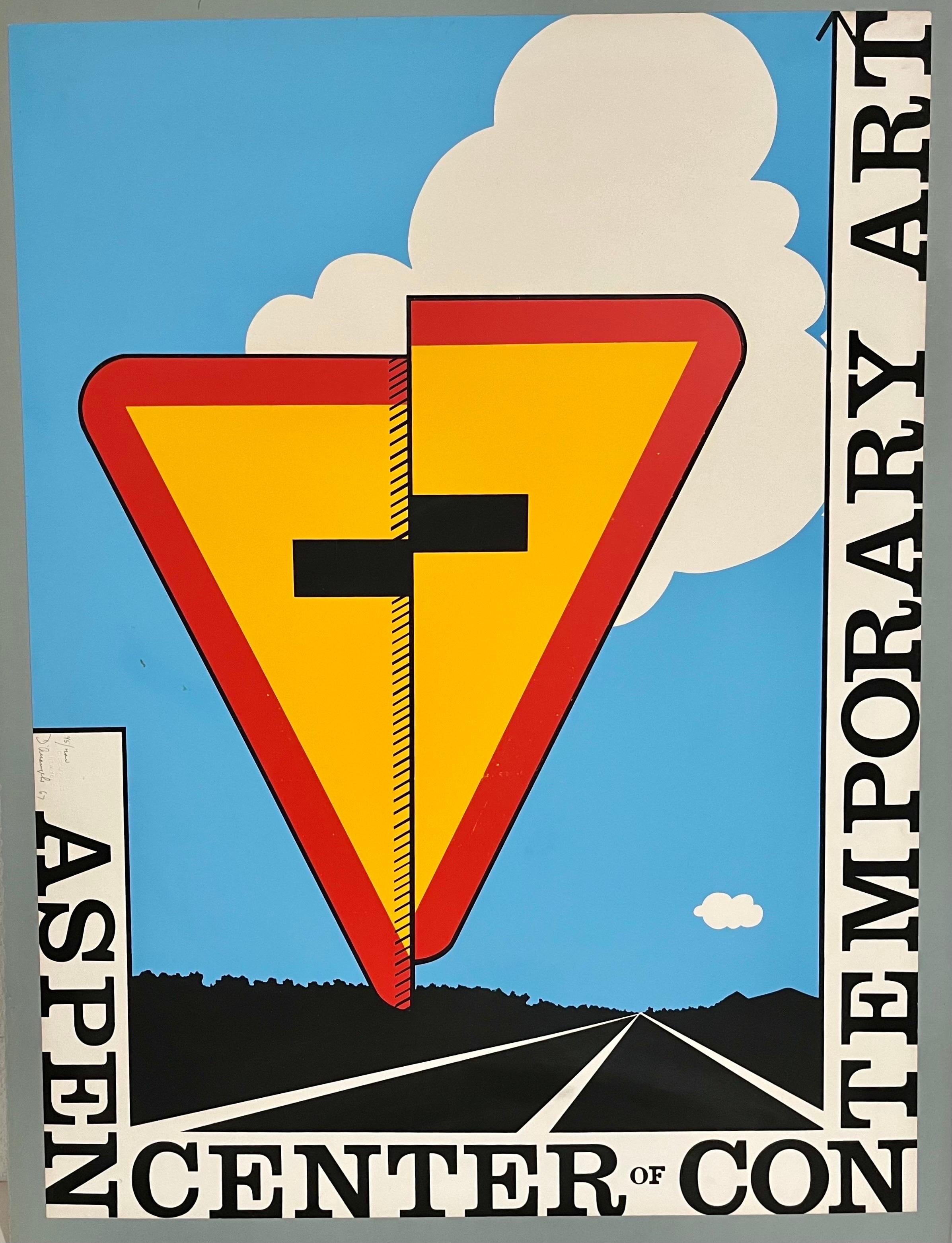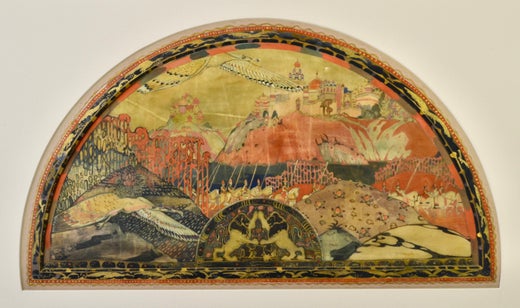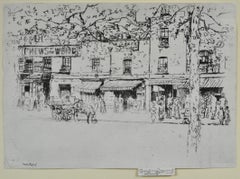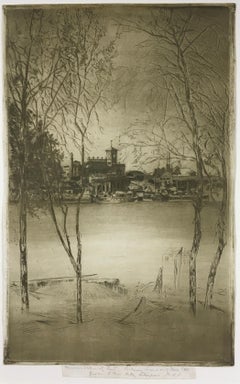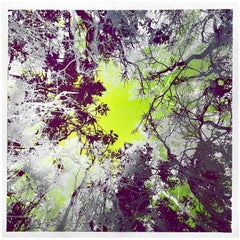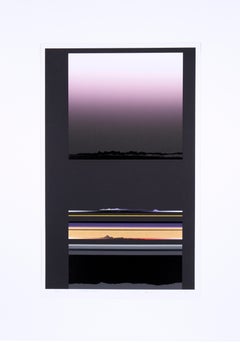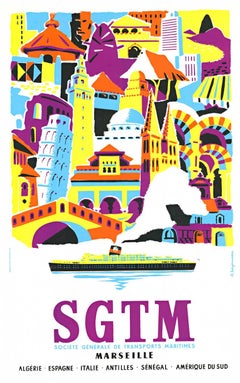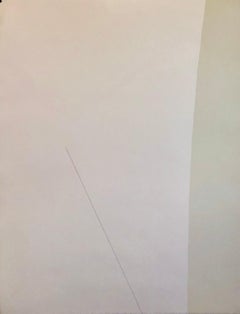Items Similar to The Wave - Rare early 20th Century British print by George Sheringham
Want more images or videos?
Request additional images or videos from the seller
1 of 5
George SheringhamThe Wave - Rare early 20th Century British print by George Sheringhamcirca 1920
circa 1920
About the Item
GEORGE SHERINGHAM
(1884-1937)
The Wave
Signed and numbered 2
Stencil print with 9 plates, designed and cut by the artist, fan shaped
23 by 42 cm., 9 by 16 ½ in.
(frame size 37.5 by 22 cm., 14 ¾ by 8 ¾ in.)
Sheringham was born in London and studied at the Slade under Henry Tonks and later in Venice, Brussels, Berlin and Paris where he held his first one-man exhibition in 1905. On his return to London he initially supported himself with poster designs and teaching. His first exhibition of fan designs was held at the Ryder Gallery in 1909 followed by another in the following year. With enthusiastic reviews in Studio he had launched his career as a decorative designer, theatrical designer and illustrator. He illustrated books by Max Beerbohm and Cyrus MacMillan. In 1921 he collaborated with his brother Hugh on a book about fishing, The Book of the Fly Rod. He wrote Drawing in Pen and Pencil (1922), with James Laver, Design in the Theatre (1927) and with Rupert Mason and R Boyd Morrison he edited Robes of Thespis, Costume Designs by Modern Artists (1928). As a decorator, Sheringham designed the music room at 40 Devonshire House, the ballroom at Claridge’s Hotel and the Paris Exhibition of 1937. He was one of the first recipients of the Royal Designers for Industry distinction in 1937. He designed scenery and costumes for ballets, opera and the theatre, working closely with the actor-manager Nigel Playfair and for the D’Oyly Carte. A memorial exhibition was held at the Leicester Galleries in 1938. Works by him are in the collections of the Tate Gallery, British Museum, Fitzwilliam Museum, Victoria and Albert Museum and elsewhere.
- Creator:George Sheringham (1884 - 1937, British)
- Creation Year:circa 1920
- Dimensions:Height: 9.06 in (23 cm)Width: 16.54 in (42 cm)
- Medium:
- Movement & Style:
- Period:
- Condition:
- Gallery Location:London, GB
- Reference Number:Seller: 22601stDibs: LU1028310657792
George Sheringham
George Sheringham was a British painter and theatre designer. One of the first recipients of the Royal Designers for Industry distinction in 1937, he is remembered for his work for the D’Oyly Carte Opera Company. Sheringham was born in London, the son of an Anglican clergyman. He was educated at the King’s School, Gloucester, the Slade School of Art and the Sorbonne, Paris.
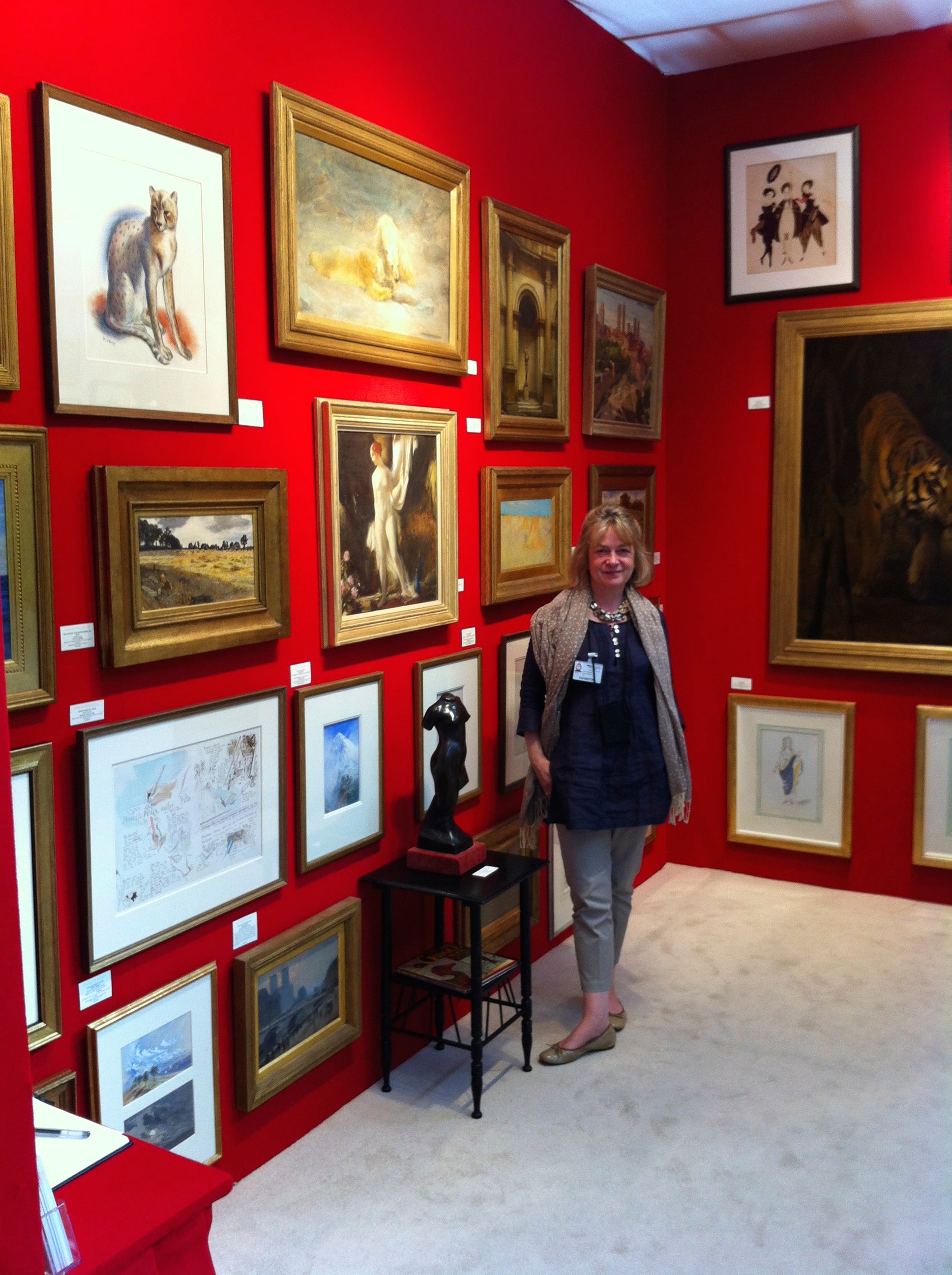
About the Seller
4.9
Vetted Professional Seller
Every seller passes strict standards for authenticity and reliability
Established in 2004
1stDibs seller since 2018
59 sales on 1stDibs
Typical response time: 3 hours
- ShippingRetrieving quote...Shipping from: Banbury, United Kingdom
- Return Policy
Authenticity Guarantee
In the unlikely event there’s an issue with an item’s authenticity, contact us within 1 year for a full refund. DetailsMoney-Back Guarantee
If your item is not as described, is damaged in transit, or does not arrive, contact us within 7 days for a full refund. Details24-Hour Cancellation
You have a 24-hour grace period in which to reconsider your purchase, with no questions asked.Vetted Professional Sellers
Our world-class sellers must adhere to strict standards for service and quality, maintaining the integrity of our listings.Price-Match Guarantee
If you find that a seller listed the same item for a lower price elsewhere, we’ll match it.Trusted Global Delivery
Our best-in-class carrier network provides specialized shipping options worldwide, including custom delivery.More From This Seller
View AllThe Street, Chelsea - 1880s etching by Whistler follower Theodore Roussel
By Theodore Roussel
Located in London, GB
THEODORE CASIMIR ROUSSEL, RBA
(1847-1926)
The Street, Chelsea Embankment
Etching, signed in the plate, signed on the artist’s tab, trimmed to the platemark by the artist, framed
15...
Category
1880s Realist Landscape Prints
Materials
Etching
Laburnums at Battersea
By Theodore Casimir Roussel
Located in London, GB
THEODORE ROUSSEL, RBA
(1847-1926)
Laburnums at Battersea
Etching, signed in the plate, trimmed to the plate mark and signed and inscribed on the tab: Theodore Roussel Inv. Between...
Category
1880s Aesthetic Movement Landscape Prints
Materials
Etching
The Corner of Cheyne Walk, Chelsea - 19th Century British Etching by Roussel
By Theodore Roussel
Located in London, GB
THEODORE CASIMIR ROUSSEL, RBA
(1847-1926)
The Corner of Cheyne Walk, Chelsea
Etching, unsigned, with the artist’s tab, signed in the plate, trimmed to th...
Category
1880s Realist Landscape Prints
Materials
Etching
The Thames, 1894 - Victorian aquatint etching of London by Joseph Pennell
By Joseph Pennell
Located in London, GB
JOSEPH PENNELL
(1857-1926)
The Thames, 1894
Signed
Aquatint
Plate size 20.5 by 26.5 cm., 8 by 10 ½ in.
(frame size 42 by 46 cm., 16 ½ by 18 in.)
Pennell was born in Philadelphia where he studied at School of Industrial Art and the Academy of Fine Arts. In 1884 he was commissioned by the Century Magazine to supply a series of drawings of London...
Category
1890s Realist Landscape Prints
Materials
Aquatint
John Nash RA - Harvesting - Schools Print - 20th Century British lithograph
By John Nash
Located in London, GB
JOHN NASH, RA
(1893-1977)
Harvesting
Lithograph
Framed
49 by 75 cm., 19 ¼ by 29 ½ in.
(frame size 65 by 91.5 cm., 25 ½ by 35 ½ in.)
On the advice of his older brother, the artist...
Category
Mid-20th Century Realist Landscape Prints
Materials
Lithograph
Lallia - British 1930s Art Deco graphic design by Marie Palmer-Smith
Located in London, GB
MARIE PALMER-SMITH
(1899-1997)
Lallia
Bears artist’s studio stamp on the reverse
Gouache, unframed in mount
24 by 17 cm., 9 ½ by 6 ¾ in.
(mount size 39 by 31 cm., 15 ¼ by 12 ¼ in....
Category
Early 20th Century Art Deco Drawings and Watercolor Paintings
Materials
Watercolor
You May Also Like
INTO THE WILD, Limited edition print, Forest, Neon, Green, B&W, Tree, Metallic
By Chris Keegan
Located in Deddington, GB
This is a Three colour screen print that includes two metallic inks. This print captures the wild nature of Monstera plant leaves, the world's favourite house plant. Limited edition ...
Category
2010s Contemporary Landscape Prints
Materials
Screen, Paper
"Night Views" Silkscreen Print by The Skyscape Artist, 25/100
Located in Soquel, CA
"Night Views" Silkscreen Print by The Skyscape Artist, 25/100.
By Tetsuro Sawada ( Japanese, 1933-1998)
This raven black geometric abstraction focuses on hard-edged horizontal lines, color, and light, giving the impression of dusk through the "bokashi," or shading, technique, which is most difficult in the silkscreen medium, a good example of Sawada's theme of the infinite beyond, the silent emptiness of the universe. Signature in the bottom right corner reads, "T. Sawada '87," titled in the bottom center, "Night Views," and numbered, "25/100," in the bottom left corner. Presented in a new white mat. Paper size: 34"H x 22"W, Mat size: 39"H x 27"W
Born in Hokkaido, Tetsuro Sawada (1933-1998, Japanese) graduated from Musashimo Art University where he majored in Western painting. In 1960, he began painting abstract oils...
Category
21st Century and Contemporary Abstract Geometric Abstract Prints
Materials
Paper, Screen
$1,080 Sale Price
20% Off
Original SGTM Marseille vintage cruise line vintage travel poster
By Raoul Berjonneau
Located in Spokane, WA
Original French cruise line vintage poster: SGTM, Societe Generale de Transports Maritimes, Marseille. Original vintage travel poster, c. 1955. Archival linen backed original, ex...
Category
1950s Abstract Expressionist Landscape Prints
Materials
Screen
Michael Gross Israeli Minimalist Conceptual Art, Abstract Jerusalem Silkscreen
By Michael Gross
Located in Surfside, FL
Michael Gross (Hebrew: מיכאל גרוס; 1920 – 4 November 2004) was an Israeli painter, sculptor and conceptual artist.
Michael Gross was born in Tiberias in the British-administered Palestine in 1920. He grew up in the farming village of Migdal. In 1939-1940, he left to study at the Teachers’ Training College in Jerusalem. In 1939, while he was away, his father was murdered by Arabs, and the family farm and home were destroyed. This event impacted on his work as an artist.
From 1943 to 1945, he studied architecture at Technion – Israel Institute of Technology in Haifa. From 1951 to 1954, he studied art at the École nationale supérieure des Beaux-Arts in Paris. He returned to Israel in 1954 and settled in the artists’ village of Ein Hod.
Gross's works are imbued with the light and spirit. They are minimalist, but never pure abstraction, always tied to natural form and laden with feeling. In his early paintings, Gross simplified form in order to concentrate on proportion, broad areas of color, and the size and placement of each element. This reductive process was also notable in his sculptures, whether in painted iron or other materials such as white concrete. In later paintings, he often juxtaposed large off-white panels with patches of tone, adding textured materials such as wooden beams, burlap and rope. Gross’s rough, freely-brushed surfaces, along with the use of soft pastel coloring, conjure up images of the Israeli landscape.
Education
1936-1940 Teachers Seminary, Jerusalem
1943-1945, Technion, Haifa, architecture, studied sculpture with Moshe Ziffer.
1951-1954 Beaux Arts, Paris with Michel Guimond
Teaching
1954 - 1954 Higher School of Education, Haifa.
1957-1960 Bezalel Academy of Arts and Design, Jerusalem
1960-1980 Oranim Art Institute, Tivon
Awards
1964: Hermann Struck Prize
1967: Dizengoff Prize
1971...
Category
1970s Modern Landscape Prints
Materials
Lithograph, Screen
Pop Art Surreal Large Colorful Screenprint with Mod Balls of Color Serigraph
Located in Surfside, FL
Titled: After the Beginning, one of his most desirable large serigraph silkscreen works. It depicts inter galactic outer space with planets, orbs of bright day glo, neon color in a sci fi landscape.
Born in New York City and living in St. Louis, Missouri, Stan Solomon...
Category
1990s Surrealist Abstract Prints
Materials
Screen
Pop Art Aspen Road Sign D'arcangelo Silkscreen Chiron Press Vintage Art Poster
Located in Surfside, FL
Allan D'Arcangelo (American/New York, 1930-1998),
"Aspen Center of Contemporary Art",
1967
silkscreen, hand signed in pencil, dated, numbered "45/200" and blind stamped "Chiron Press, New York, NY"
32 in. x 24 in.
Allan D'Arcangelo (1930-1998) was an American artist and printmaker, best known for his paintings of highways and road signs that border on pop art and minimalism, precisionism, Abstract illusionism and hard-edge painting, and also surrealism. His subject matter is distinctly American and evokes, at times, a cautious outlook on the future of this country. Allan D'Arcangelo was the son of Italian immigrants. He studied at the University of Buffalo from 1948–1953, where he got his bachelor's degree in history. After college, he moved to Manhattan and picked up his studies again at the New School of Social Research and the City University of New York, City College. At this time, he encountered Abstract Expressionist painters who were in vogue at the moment. After joining the army in the mid 1950s, he used the GI Bill to study painting at Mexico City College from 1957–59, driving there over 12 days in an old bakery truck retrofitted as a camper. However, he returned to New York in 1959, in search of the unique American experience. It was at this time that his painting took on a cool sensibility reminiscent of Roy Lichtenstein and Andy Warhol. His interests engaged with the environment, anti-Vietnam War protests, and the commodification and objectification of female sexuality. D'Arcangelo first achieved recognition in 1962, when he was invited to contribute an etching to The International Anthology of Contemporary Engraving: America Discovered; his first solo exhibition came the next year, at the Thiebaud Gallery in New York City. In 1965 he contributed three screenprints to Original Edition's 11 Pop Artists portfolio. By the 1970s, D'Arcangelo had received significant recognition in the art world. He was well known for his paintings of quintessentially American highways and infrastructure, and in 1971 was commissioned by the Department of the Interior to paint the Grand Coulee Dam in Washington state. However, his sense of morality always trumped his interest in art world fame. In 1975, he decided to quit the gallery that had been representing him for years, Marlborough Gallery, because of the way they handled Mark Rothko legacy.
D'Arcangelo rejected Abstract Expressionism, though his early work has a painterly and somewhat expressive feel. He quickly turned to a style of art that seemed to border on Pop Art and Minimalism, Precisionism and Hard-Edge painting. Evidently, he didn't fit neatly in the category of Pop Art, though he shared subjects (women, signs, Superman) and techniques (stencil, assemblage) with these artists.He turned to expansive, if detached scenes of the American highway. These paintings are reminiscent of Giorgio de Chirico-though perhaps not as interested in isolation-and Salvador Dali-though there is a stronger interest in the present and disinterest in the past. These paintings also have a sharp quality that is reminiscent of the precisionist style, or more specifically, Charles Sheeler. 1950s, Before D'Arcangelo returned to New York, his style was roughly figurative and reminiscent of folk art. During the early 1960s, Allan D'Arcangelo was linked with Pop Art. "Marilyn" (1962) depicts an illustrative head and shoulders on which the facial features are marked by lettered slits to be "fitted" with the eyebrows, eyes, nose and mouth which appear off to the right in the composition. In "Madonna and Child," (1963) the featureless faces of Jackie Kennedy and Caroline are ringed with haloes, enough to make their status as contemporary icons perfectly clear.
Select Exhibitions:
Fischbach Gallery, New York,
Ileana Sonnabend Gallery, Paris,
Gallery Müller, Stuttgart, Germany
Hans Neuendorf Gallery, Hamburg, Germany
Dwan Gallery...
Category
1960s Pop Art Abstract Prints
Materials
Lithograph, Screen
